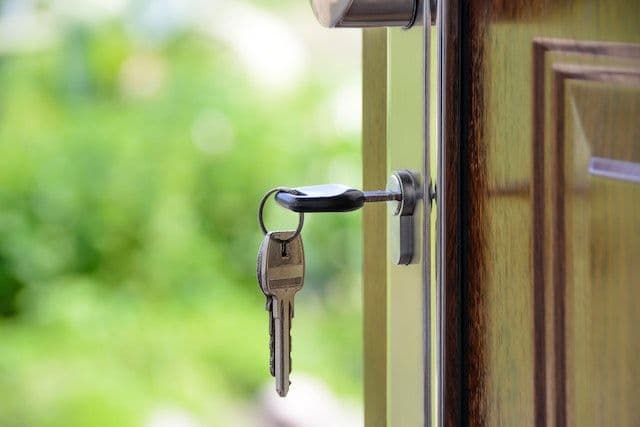How Much Do I Need To Save For A Flat Deposit In London?

Saving up for a flat deposit in London can be a daunting task. It’s notoriously expensive and competitive.
But don’t worry! As you embark on this savings mission, we’re here to help break it down so it doesn’t seem so overwhelming.
What Is A Flat Deposit?
In order to buy a flat, you have to pay a deposit. This is a percentage of the flat’s value, and you pay the rest through a mortgage.
Generally for your flat deposit, you’ll pay at least 5-10% upfront. The remaining money will need to be borrowed from the bank as a mortgage.
Essentially, the bigger your deposit, the smaller your mortgage. As mortgages earn interest over time, paying a higher flat deposit can help you with smaller monthly payments.
How Much Is A Deposit?
Good question…unfortunately, there is no specific answer. Deposits typically range from 5% to 20% of the property’s value.
The average flat price in London is currently around £500,000, which means that the average deposit is roughly between £25,000 and £100,000.
Start by thinking about the type of property you want and where you are looking to live. This should give you a good indication of the average price and therefore, the deposit you need.
What Is The Benefit Of Paying A Higher Deposit?
You might be reading this and thinking: Why don’t I just pay 5% and be done with it? Whilst it’s tempting to put down a lower chunk of money at the start, this could have financial implications later.
For example, say you have a £500,000 flat and you only put down £25,000 as a deposit, this means you’ll need a mortgage of £475,000.
Firstly, to even have a chance of securing a mortgage this large, you’re going to need a household income at least 1/4th or 1/5th of that price. That means unless you’re earning between £92,000 to £120,000, it’s unlikely you’ll be approved for a loan this size.
Secondly, you’ll have to pay interest on the loan every year. If the interest rate is at 3% for example, you’ll be paying over £14,000 just in interest in your first year. Not ideal.
Having a larger deposit can help you reduce these payments by lowering your loan amount. The lower the loan, the smaller the interest and the easier it will be to pay off!
How Do I Figure Out How Much I Need To Save?
When thinking about how much to save, it is important to think about the ratio between your deposit and mortgage. This is called the loan to value (LTV) ratio.
For example, if you have a 15% deposit, you will need an 85% LTV mortgage that you will pay back in monthly installments. Start by thinking about how much you can afford to pay back month-on-month and then work backwards from there.
Another thing to note is that, the higher the LTV, the higher the interest rate. If you want to reduce the amount of interest you pay in the long-run, think about saving up for a bigger deposit to save money in the future.
What Do I Do If I Can’t Afford An Average Deposit?
Obviously, 10% of a property's value is a big sum of money to pay in one go, so we’ve put together some ideas that can help make it more viable.
Change The Location
Location makes a huge difference when it comes to property prices.
Flat prices vary massively in London, this mostly changes based on how close to the city the property is as well as the transport links available within it. If you’re looking for cheaper options, shop around for more affordable locations.
For example, the median value of properties in certain areas in East and South London are well below the average £500,000. So, make sure you do your research before flat hunting!
Mortgage type
If you aren’t able to save up for a big deposit but still want to buy somewhere, shop around for alternative mortgage options.
Schemes like help-to-buy only require a 5% deposit, though this may mean higher monthly payments once the property is yours. Shop around and look for options that work best with your financial situation, but be sure to keep an eye on the long-term implications of whatever loan you go for!
Buy with someone else
Buying with a friend or partner is a great way to save quicker. However, be aware that things could get tricky if you decide to sell.
If you do go for this option, make sure you have a water-tight contract in place for all eventualities. You want to make sure that you have everything covered!
How Can I Save For A Deposit?
Paying between 5% and 20% is a big ask as a first-time homebuyer. However, there are lots of ways to make the process of saving money easier.
First of all, work out how much disposable income you have after you pay rent, bills and all the necessities. Then, put a certain amount of money each month in a savings account. If you know you will need to be saving for more than two years, perhaps look into a lifetime ISA or a savings bond.
Secondly, have a look at personal finance platforms online! These tools provide great tips and tricks to save quicker and can help you stash the cash in a shorter period of time.
Conclusion
A flat deposit in London is typically between 5% and 20% of the flat’s total value. How much this is depends on the type of property you’re looking for. However for London, you should save roughly between £25,000 and £100,00 for an average deposit.
Of course, this is dependent on factors like the area, mortgage type and if you can buy with someone else. So, make sure you do your research before putting a deposit down on a flat!